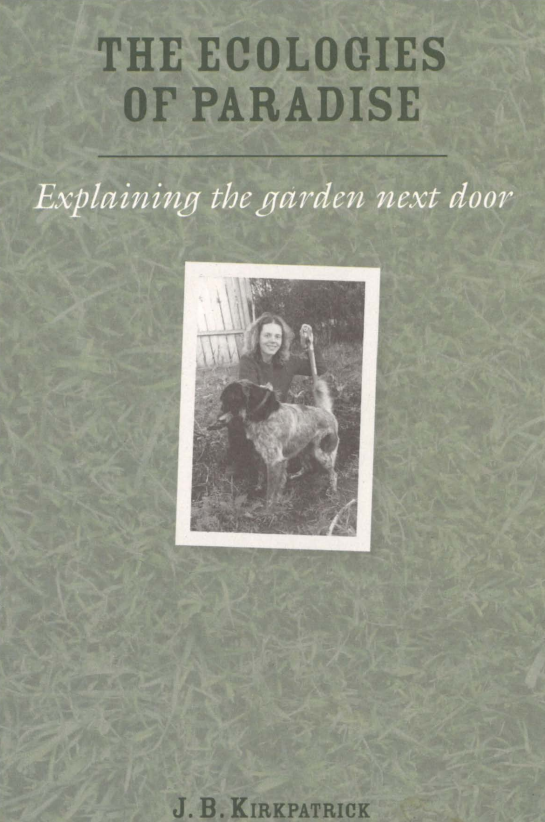
Free trees
About twenty years ago Jamie Kirkpatrick wrote a book The ecologies of paradise: explaining the garden next door. (PDF)

In the Australian blogosphere at the time (how to find those comments? on blogspot? (oh look searchblogspot.com but no) there was some dismissive commentary in regard to Jamie’s comments about 'leafy suburbs' (these being the posher suburbs in Australia), and specifically, commentary by the critics that people do not grow trees because they were poor, as in they did not have the money to do… —whatever it is to allow trees to grow (even if the trees do most of the work).
I found this extra hard to take as the commentary was not coming from the old enemy marxists but libertarians and their ilk. While I tried to explain what Jamie Kirkpatrick was getting at I never realy grappled with the cognitive dissonance involved. (No, I will not accusing them libtards as really being leftards).
At about the same time, I was living in, what we call in Australia, the urban-bush interface, on the side of the mountain in the suburb of South Hobart (which is west of the city of Hobart because | colonial planning) in Tasmania. So, about twenty years ago, there was a little event held in the tiny local park in Strickland Ave (that once held a community dance hall, burnt down inthe '67 fires, though the maypole ground is still there even if the dance was forgotten).
Anyways, there were a couple of stalls and the Hobart City Council stall had FREE tree giveways in tubestock. There were takers and all-comers, and then…
—basically, the poorest of our community sneered at the offer when welcomed to the stall. The staff at the stall emotionally ducked for cover. I guess these days it would have got physically stressful as well.
It may be peeps are poor and like anyone can hold anti-tree sentiments, but rejecting free stuff so vehemently indicates that other more culturally-based things are going on.
The sneering indicated they were ① looking for some action as ② general pleasantries were avoiding in response to the initial engagement, almost as if ③ they had been accused of being greenies because they were offered trees, and they had to defend their honour by vociferously rejecting the free trees.
So for me, the cognitive dissonance opportunities arrived in the blogosphere when suddenly you have libertarians defending the choices of people with intergenerational welfare dependence. WTAF.
There is a also lot more going on here than the Marxtard/libtard economic realities and their emergent superstructures of order and control.

One of reasons I enjoy the work of Mary Douglas (who I had read about five years before the events described) is that it looks at the choices people make, as individuals and as members of groups, with regard to their perceptions of the world. All choices are economic, sure, but not all choices are without style, that distinction was what I had trouble conveying two decades ago.
Mary Douglas (et al)generally used the context of our perceptions of risk to 'nature'. And that this was an 'afferent bis'. The use of the word 'bias' is another reason I enjoyed the work of Mary Douglas. Not much discussion of it back then as a causally creative movement or urge, bias is something to be overcome.
The work as a typology I did not enjoy so much. More of that another post.
However, while 'nature' is abstract as concept enough, it still corrals our thinking styles a little too much. At the time I read it I also glossed my reading of Mary Douglas with perceptions of risk to 'morality'. At that time, those for whom risks to nature were thought minimal (libtards) also felt the risk to 'morality' was maximal. Nature was robust corresponded well with morality is fragile. Greenies however felt the inverse, nature is fragile and morality is robust.
It’s likely the poor neighbours would respond in a similar way to a libertarian stall, if there was some cultural box they could put them in which meant, like the term ‘greenies’, not-us. (In Mary Douglas’ typology they would form an ‘isolates’ group.)
Besides choices, these afferent biases could also be used in reference to cultural studies of artefacts and styles, in that certain styles becaome associated with certain perceptions (of risk toX ), but in time, due to fashion, items in a cultural 'design language' become associated with different perceptions of risk of X. Or to Y.
X being nature/morality/faith/world.
These days the local anti-greenie agenda is over-ridden by imported wares like anti-wokeeness, which arrived in Australia before the wokeness itself. Much like anti-political correctness arrived before political correctness. At least in Tasmania.
So planting a tree, at that time, was replete with a rejection by my poorest Tasmanian nieghbours, because they did no do that shit, which in part proabably reflected earlier rejection of work in which one labours for leisure, if not pleasure, in one's own garden, if only to damn that worlding, that gardening effort in a street of a now created leafy suburbs. Leafy suburbs and their trees reflect a world they reject because they have no access to it. Even if you offer them free trees this does not change. And even if they planted them.
In any case real work by real men consists in cutting trees down, and maintaining lawns (which they did not do either). Now the arts in Tasmania employ more people than forestry does. More tourists visit the penal colony of Port Arthur Historic Site in one year than it held convicts in its entire operational period of decades.
The world changes, how fragile is it really?

Being poor is not the reason they rejected free trees, it is simply one factor or function of their identity politics as constrained by the perceptions of risk that inform their predicament. The 'afferent bias' can be both be by nature and by nurture. Yes, economics but is that yes also in their spiteful no to an offer of free trees?
Some predicaments being a type of worlding in which one has little to no actual power and all you have left is a 'fuck you'. Ressentiment as a lifestyle no-choice, there are no stories here, only places you know too well or will never know, and inflicting pain is your only option.
At the time I was also poor, but did not take a tree because where we lived had enough trees, and I had already planted quite a few, and are still there growing today, though I have moved on.
Refs & some other links.
Kirkpatrick, J. B, and Christina Kirkpatrick. The Ecologies of Paradise: Explaining the Garden next Door. Sandy Bay, Tas.: Pandani Press, 2006. (PDF)
Jamie Kirkpatrick's publications
Trees in suburban gardens Interview on ABC’s Science Show.
Explaining variation in front gardens between suburbs of Hobart Tasmania
Thought styles: critical essays on good taste by Mary Douglas, Thousand Oaks, Calif.: Sage Publications (1996)
“Book Review: Thought Styles: Critical Essays on Good Taste.” by Geoff Cooper. Sociological Research Online 2.4 (1997): 109–109. Web. DOI 10.1177/136078049700200405
